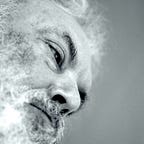The Creative Power of Cookery
Several years ago, a friend suggested me to write a book with the title of ‘Cosmic Cookery.’ He knew I was a versatile hobby chef and food photographer, and also knew that I am a writer and spontaneous philosopher. So he thought I should write a book that while talking about cooking actually talks ‘philosophy.’ I found the idea not bad but never sat down to actually start writing that book.
Honestly, it was that adjective ‘cosmic’ what disturbed me in the title. It sounds too grandiose for my taste, and that’s the hidden reason I never tackled the job. I never actually think in ‘cosmic’ dimensions, and the least when I prepare food, for it is a very down-to-earth activity, very manual, and very little ‘philosophical.’ I would rather put it on the same line as cleaning, sweeping your house in the morning before you brew your tea for breakfast. Who would enjoy eating a good menu at a dirty table on a dirty floor in a dirty house?
The culinary journey is not a lofty, airy, high-strung quest; in other words, it is not intellectual but if ever, artisanal. That is why it is truly helpful for grounding us, and that in turn is the reason it has spiritual value.
It humbles through the need for constantly cleaning up your space, through the need for learning several techniques that are all-manual and repetitive, and the need for attention to what is actually happening with the food you are going to prepare. Is it going to be overcooked? Is it going to be undercooked? Is it going to be spoiled through wrong handling and insufficient product knowledge?
Each moment during the cooking process, something happens with the food: it alters its texture, its composition, and you need to anticipate these processes for each and every piece of meat, fish or vegetable you cook.
Cooking is actually an alchemical process, which is why when you engage in cooking, and you do it with all your attention, you are at the same time doing what the old Daoists called ‘internal alchemy.’ All you do on the outer level, you do it also inwardly, which is one of the secrets of integral spirituality, for all in our universe is connected, and there are no single processes that affect no others.
Hence you need to develop acute awareness about how the cooking process of your food emulates a reflective inner alchemical change within your own body chemistry. Such changes are barely perceptible, when you are still a beginner in the culinary arts, but professional chefs will tell you about it if you ask them and they are in a sharing mood.
For me personally, I clearly sense inwardly if a dish I am cooking is going to be delicious or if I made some or the other mistake and the result is poor — even if I am not at all aware of such mistake. I mean I sense that before the end result shows up and can be seen, smelled and tasted. It is a kind of foreknowledge, an intuitive knowing that comes from deep inside and cannot be rationalized. It can barely be shared as it is difficult to put it in words. I feel awkward when I need to verbalize it. It is like I have happy and whole sensations when the process is going well, and rather unhappy sensations when something goes wrong, even though I am not aware at all that some seasoning is wrong or that the dish will end up either undercooked or overcooked. For if I were aware of anything not in order, I would of course immediately correct it so as to save the dish, and thereby save myself the disagreeable task to throw away the mess.
Now, don’t get me wrong. I feel guilty already that I forgot an important introduction into the way of cooking that is mine, and which is totally spontaneous. I mean I do not cook from recipes, never ever. When I read a recipe, I do this not at meal times, but when I am into my bookish mood. Then I put away the cookbook and forget about the new recipe for some time. Once, then, when the moment feels right, I remember the basic pattern of the recipe, without having memorized any quantities, and I improvise the dish. All my cooking is done that way, all is improvised and quantities are approximate, never exactly measured.
I learnt this already as a child from my grandmother who also never followed recipes to the letter, and who spoilt a good amount of dishes because of her spontaneous approach to cooking. But when a dish did go right and succeeded, it was brilliant and would have been convincing a 5-star chef anywhere in the world.
Then, as the manager of your household, you can eventually take action to care for the best food intake: and you become your own chef, and your culinary journey will then be a path with a heart.
